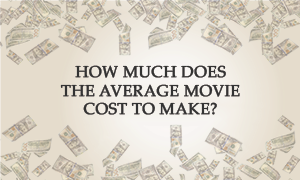 Among the most frequent questions I’m asked by those new to the film industry is “How much does the average movie cost to make?”
Among the most frequent questions I’m asked by those new to the film industry is “How much does the average movie cost to make?”
The short answer is “it depends”. It’s similar to asking “How much does the average meal cost to make?” It depends where you are, who’s making it, for whom and whether Robert Downey Jr. is involved (ok, so maybe this last one only applies to movies).
This would make for rather a short blog article, so instead I thought I’d take a deeper look at whether there are useful ballparks which can give a sense of scale on movie budgets.
I built up a dataset of 5,713 feature films released domestically (i.e. in US & Canadian cinemas) for which I could find a public budget figure. See the Notes section for details and caveats of budget information.
For readability, I’m going to write as if all the budget figures stated below are pure fact. In reality, some will be over- or under-estimates and almost all publicly available figures have murky provenance. So for the rest of today’s article please imagine I have added “reportedly” ahead of any statement of budget figures.
$18 million, give or take
Between 1999 and 2018, half of all movies released in US cinemas cost under $18 million to make.
If we line up all those movies from the cheapest to the most expensive then we get the chart below. On the far left are the movies which were the cheapest to make (such as Primer, shot for $9,000) and on the right are the priciest (such as Pirates of the Caribbean: On Stranger Tides, which reportedly cost $410 million).
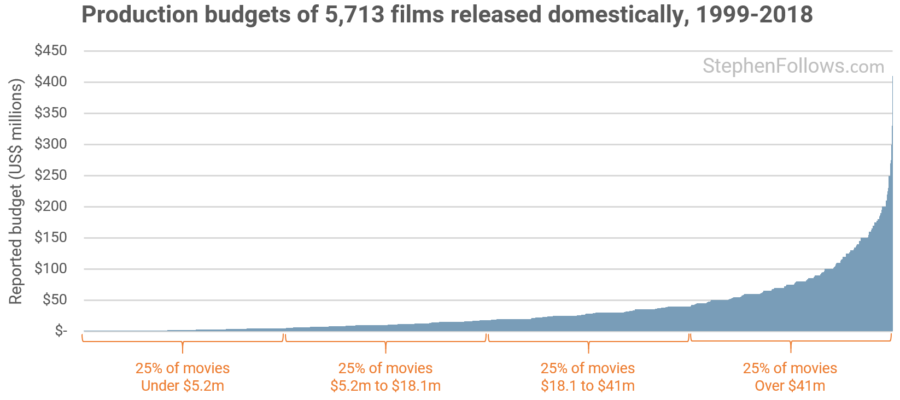
The moviemaking process has changed dramatically over the past twenty years and so today I’m going to focus on the budgets for the past five years. Next week I’ll show how they’ve changed over the past two decades.
What is the most expensive movie genre?
A budget of over $18 million may put you in the higher tier of movies but it isn’t even a quarter of the median budget for Adventure films ($76m). Other expensive genres include Sci-Fi ($61m), Fantasy ($60m) and animated movies ($60m).
At the other end are music-based movies (median budget of just $7m), Horror ($8m) and Romance ($11m).
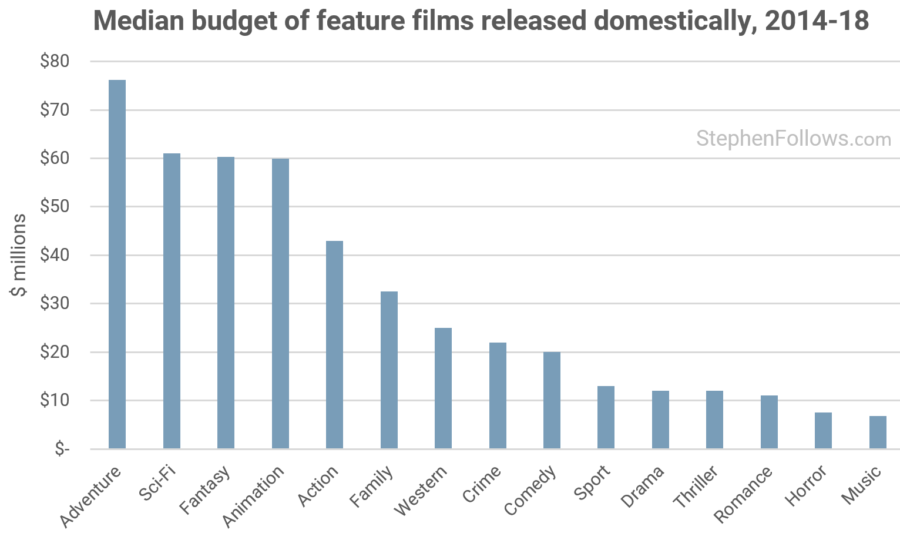
Do you have to spend money to make money?
The reason producers increase their budgets is to make a more valuable product, paying for bigger movie stars, making it more adrenaline-inducing or visually interesting. But every extra dollar they spend has to be raised and repaid.
Movie profitability is a complex topic (and one I’ve covered many times before) so for today’s article, I’m not going to get into the weeds of which movies are or are not likely to have made money. Instead, we will simply overlay the median domestic box office gross (i.e. the cash collected in US & Canadian cinemas from ticket sales) for each genre with budget data from the previous chart.
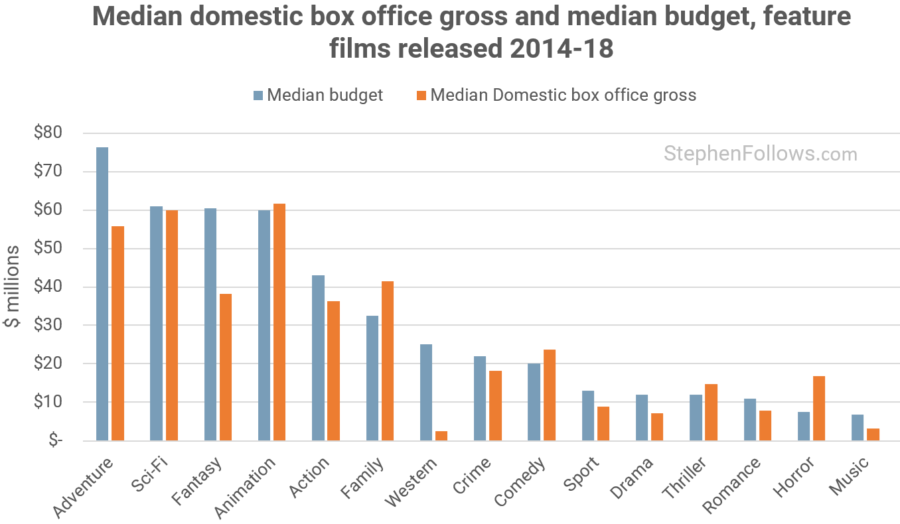
Perhaps an easier way of understanding what this data is telling us is to look at the ratio of the two figures. For example, Sci-Fi movies have a median domestic gross of $60m on a median budget of $61m – giving it a ratio of 1. Compare this to Westerns, where the median gross is $2.4m on a median budget of $25m (a ratio of 0.1).
Horror hugely outperforms other genres, collecting an average of 2.3 times its production budget at the box office.
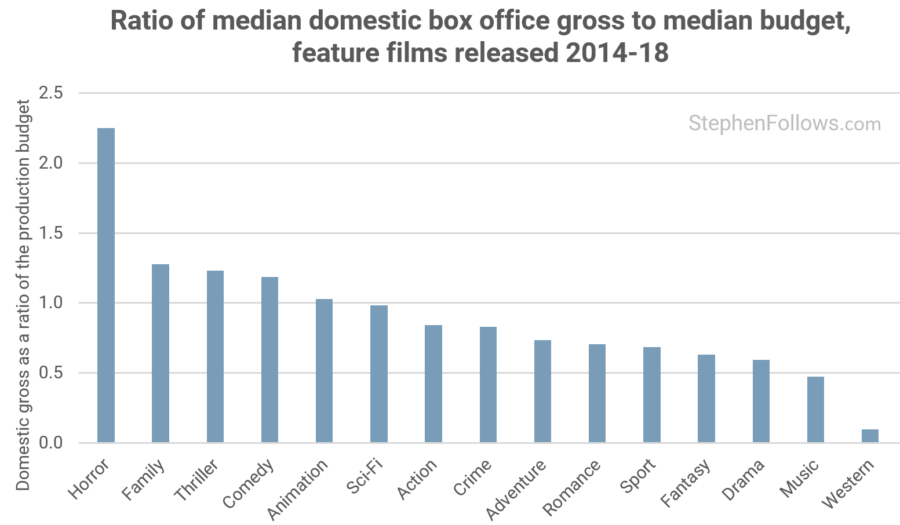
Further reading
 If you want to read more about budgets then you may enjoy these past articles:
If you want to read more about budgets then you may enjoy these past articles:
- How do film budgets change as they grow?
- Do filmmakers lie about their budgets?
- Has the mid-budget drama disappeared?
- What’s the average budget of a low or micro-budget film?
- What is the average UK film budget?
Today we have been looking at production budgets, rather than the additional costs involved with releasing and marketing a movie. If you want to learn more about how much more is spent by studios once the movie is finished then you may enjoy these articles: How movies make money: $100m+ Hollywood blockbusters and How films make money pt2: $30m-$100m movies.
Notes
The data for today’s research came from the Opus / The Numbers, IMDb, Wikipedia, Box Office Mojo and the film trade press. I manually fixed any suspect figures I found, such as the Chinese war epic which IMDb claims cost $18.
The publicly available figure should be regarded as a rough ballpark, rather than a precise figure for a bunch of reasons. We can’t trace the original source of the figure, we don’t know if they are including soft money/rebates, the filmmakers may not be telling the truth, etc. A while ago, I gained access to the full, real costs and income of 29 Hollywood movies budgeted over $100m and so was able to compare their true cost with the figure stated on Wikipedia. I found that on average these movies cost 12.5% more than their Wikipedia entry stated.
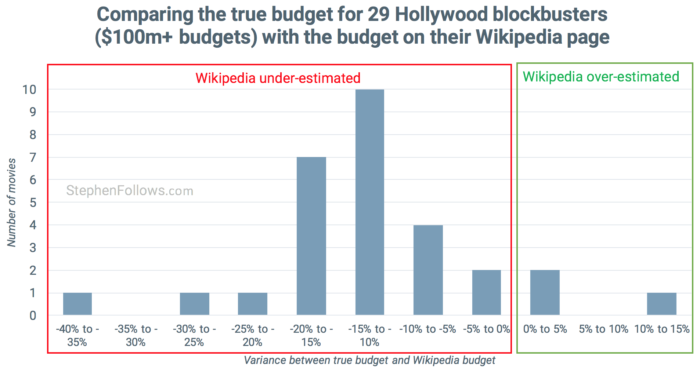
I don’t know if this pattern is reflected with lower budget movies.
The genres come via IMDb, whereby films are permitted to have up to three genres. I appreciate that the IMDb genre model leaves a lot to be desired (i.e. over-classifying projects as a ‘Drama’, stating ‘Animation’ as a genre rather than a production method, etc) but I fear that unpicking this will have to wait for a future research project!
Epilogue
Next week I’ll continue the journey, looking at how budgets have changed over the past two decades.

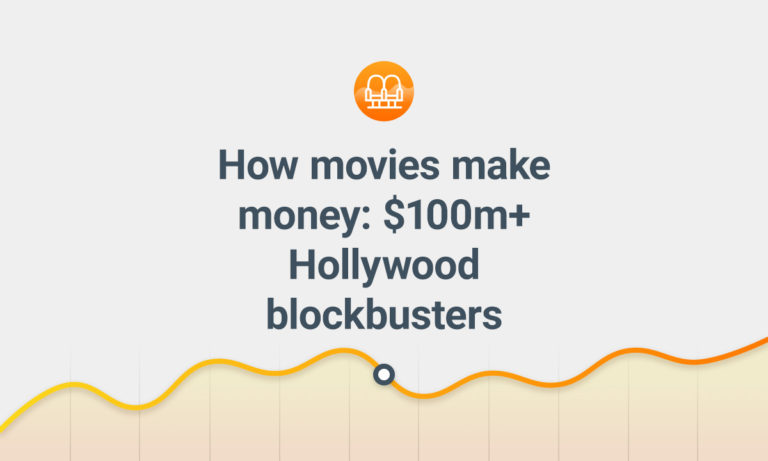
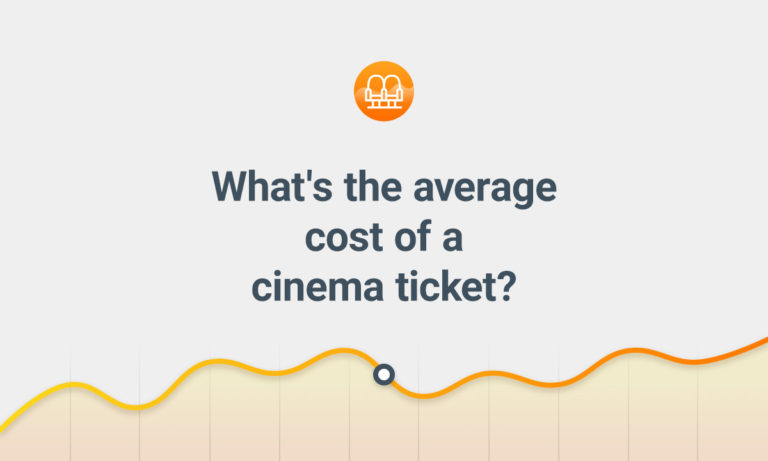
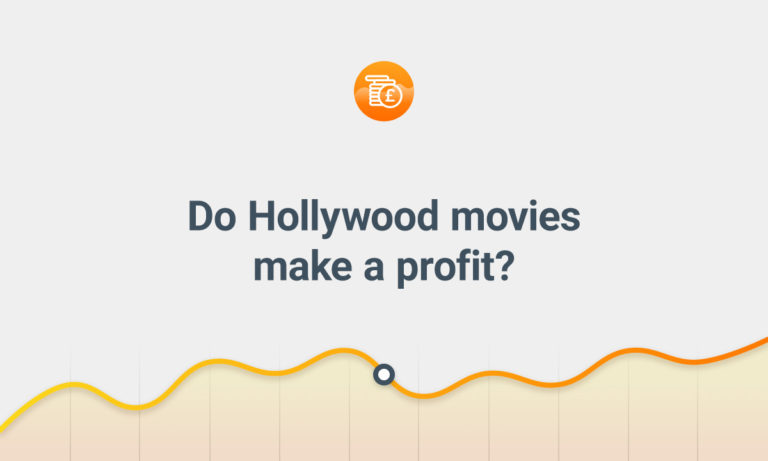

Comments
Excellent research grateful for the info
There are costs and then there are costs! And then again, there are other costs!
Are marketing swaps (TV ads in exchange for TV rights) real costs? How about points on gross for key players? When the director, the cinematographer and the three main roles are on points and the up-front production costs (studio hire, crew, etc.) are covered by product placement bonds, things get mighty opaque and assigning what are genuine costs and what is in effect a profit-share gets difficult!
I am written a book based on my mother’s life , I wandering how much would cost and if any producer would took a chance in turning this book into a movie
I’ve written a screenplay that has four basic locations: 1947 New York City, the small town of Millbridge, Maine, an island two miles off the Maine coast, and Saranac Lake, NY. Action spans 49 years. I know cost depends greatly on casting but do the locations and time covered in the story contribute greatly to the budget?
Yes, locations are expensive, and a large part of the budget of smaller films. (Stars and effects might take up a bigger chunk of bigger budget productions.) Also period films are generally more expensive. You can use a present-day location as-is, but you need to replace or hide every car and bit of machinery for a period setting.
In a previous post, Stephen noted that adaptations from novels are less profitable. They don’t do less well at the box office, they just cost more to make because their authors weren’t thinking of the film adaptation when they wrote the story. (Or so goes the theory.) Do I remember that correctly?
1947 NYC sounds like the most expensive part. You probably need to have a plan in mind for how you might shoot that when you pitch to producers. Good luck with it.
Any idea why Westerns fared so badly? Is it perhaps a smaller sample size skewed by a few stinkers? If so, what were the offending Westerns that brought the side down?
Always wonderful insights hidden amongst those numbers.
Thank you so much Stephen!! Helps so much if you’re trying
to figure out whether to bring in a script for production, you have
no idea how much!
Unfortunately westerns did well with the post-war, boomer crowd but not as well with millennials or Gen Xers. The reason? All white-male casts, save the “villains” who were Mexican or Native American. There were very little roles for women or people of color. America doesn’t look like that anymore.
A western could still do well, if it included a more diverse cast, which wouldn’t be THAT hard because if you study the REAL west you will see that there were a lot of women and minorities in the west.
I would hope when considering life of the past 2 years, that comedy and RomCom will have a bigger audience. Both of those need recognizable talent to help sell, which ups the budget. Would love to see deeper data of RomCom, both domestic and int’l for the past 4-5 years….
I disagree with your statement about novels. Not all novels are the same. There are some that deal with issues such as: angels, demons, God and the supernatural. I know for a fact, that there is plenty of interest in at least some of that. Some novels are capable of being the next box office hit. Since the cost of such movies is relatively low, the payoff could be very large.